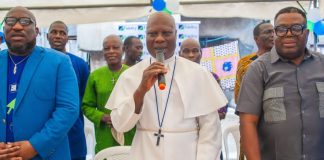🌿 Ruzu Non-Alcoholic Herbal Bitters
Ruzu Non-Alcoholic Herbal Bitters is a natural health supplement specially formulated to:
- ✅ Promote general wellness
- ✅ Detoxify the body
- ✅ Support the treatment of various ailments
Made from a powerful blend of 100% organic and medicinal herbs, Ruzu is completely alcohol-free, making it ideal for:
- 👪 All age groups
- 🌱 Health-conscious individuals
- 🌿 Anyone seeking non-alcoholic herbal remedies
Whether you're looking to boost your vitality, cleanse your system, or support healing the natural way, Ruzu Bitters offers a trusted herbal solution.
Igbo-Biafra, or the South-East, has a strong basis for seeking redressal independence from Nigeria, based on both historical grievances and compelling legal justifications backed by international law. For decades, the Igbo people have experienced social and economic discrimination, political marginalization, and structural exclusion. Given these circumstances, the South-East’s right to self-determination and maybe independence should be given careful thought.
This argument is supported by several important factors:
Considering the South-East as a state-like entity vying for independence from a parent state that has legitimate claims to it is one of the relational factors.
reflecting the South-East’s unsuccessful attempts to obtain equitable representation within the Nigerian state through internal self-determination.
Group injury demonstrates the irreversible injury and collective harm that the Igbo people endured under Nigerian rule.
Relational Aspects: The Southeast Region as a State-Like Organization
Igbo-Biafra, often known as the South-East Region, has historically exhibited the traits of a state. A separate ethnic group with a distinctive cultural, social, and linguistic identity, the Igbo nation predated the colonial establishment of Nigeria by a considerable amount of time. The colonial authorities’ arbitrary limits compelled the Igbo people to form an artificial union with other communities whose political goals and cultural values have continuously clashed with their own. Despite Nigeria’s claims to sovereignty over the South-East, the Igbo people have not been adequately represented or served by the governance system, which has resulted in an ongoing identity problem and political marginalization inside the Nigerian state.
The Igbo people have demonstrated all of the traits that international law defines as a “people”: a common ethnicity, language, cultural legacy, and sense of self-identity. A state-like entity within Nigeria, the South-East has a long history of social cohesion, political organization, and a shared desire to shape its own destiny. Nigeria’s inability to fairly integrate the Igbo people only serves to bolster the South-East’s argument as a unique society with a rightful claim to independence.
Read Also: Bago Invites Diaspora Investors to Boost Niger State’s Economy
Nigeria’s Obstructed Attempts at Internal Self-Determination
Within Nigeria, the South-East area has made numerous attempts to exercise internal self-determination. The South-East aspired to reintegrate into Nigerian politics and achieve reconciliation after the Nigerian Civil War ended in 1970. The Nigerian government has consistently blocked the Igbo people from achieving equality and meaningful representation inside the federation, notwithstanding these efforts. The allocation of economic resources, development prospects, and political power all clearly reflect this exclusion. Due to persistent marginalization in federal appointments, state formation, and resource distribution, the South-East has fewer states and representation than other regions.
The government of Nigeria, for example, has given preference to other regions over the Igbo people by limiting political appointments to the South-East region. The South-East of Nigeria has been unable to realize its goals because of this willful marginalization. When a group within a state is denied the opportunity to fully participate in government or to equally benefit from the resources and opportunities available to it, it has a legitimate right to seek external self-determination, according to international law. In the 1995 case of Katangese Peoples’ Congress v. Zaire, the African Commission on Human and Peoples’ Rights stated that when there is verifiable proof of human rights abuses and a rejection of internal self-determination, external self-determination is warranted. The scenario in the South-East closely fits these requirements.
Group Harm: The South-East’s Collectivized and Irreparable Damage
The state of Nigeria has caused significant and irreversible damage to the South-East region. A persistent sense of fear and alienation among the Igbo people is a result of this collective harm, which encompasses social prejudice, political exclusion, and economic hardship. The government of Nigeria has implemented policies that have economically marginalized the South-East since the Civil War. These policies include limiting the expansion of Igbo-owned firms, denying federal investments, and providing little infrastructure development.
Furthermore, there is a widespread culture of targeted violence against Igbo people and ethnic discrimination. The insecurity that Igbos experience in Nigeria is emphasized by instances of violence against them, especially during regional conflicts and political elections. According to the international declaration on friendly relations from 1970, a state can only maintain its territorial integrity if it treats all of its citizens equally. The aggrieved populace has a right to use secession to compromise territorial integrity when a state does not adhere to this norm.
International legal precedents, such the Kosovo Advisory Opinion (ICJ, 2010), further bolster the South-East’s argument by acknowledging that secession may be permitted in situations when the state has harmed a particular population inside its borders irreparably. Similar circumstances exist in the South-East, where the Igbo people’s demand for self-determination is justified due to the Nigerian state’s continuous failure to protect their rights and welfare, causing irreversible harm.
Foundations of Igbo-Biafra’s Claim in History and Law
Before Nigeria was established, the Igbo people had a unique political, social, and cultural identity. The Igbo Nation functioned independently, with a unified community structure and governance that mirrored the ideals of its citizens. By disregarding the distinct identities and political structures of the region’s member states, the colonial amalgamation that established Nigeria pushed the South-East into a political structure that has consistently marginalized and oppressed it.
International precedents that acknowledge a distinct people’s right to seek self-determination in the event that they are coerced into a union against their will are consistent with this history. The right to self-determination and the obligation of the state to uphold it are both affirmed by the 1975 Helsinki Final Act and the 1993 Vienna Declaration. Nigeria’s breach of these norms strengthens the South-East’s case for independence and calls into question its claims to territorial integrity over the region.
The Equal Rights Principle and Nigeria’s Inability to Respect It
A fundamental tenet of international law is the equal rights principle, and the 1970 Declaration on Friendly Relations requires governments to govern without discrimination based on race, creed, or color. Nigeria has consistently failed to give the South-East equal political and economic possibilities, in violation of this principle. Nigeria’s commitments under international law are violated by this methodical exclusion, which supports the South-East’s demand for external self-determination.
In instance, the Declaration on Friendly Relations states that a state may only maintain its territorial integrity if it upholds self-determination and equal rights inside its boundaries. The South-East now has a valid reason to seek independence since Nigeria has given up its claim to geographical integrity and indivisibility by failing to maintain these criteria for the region.
The South-East’s Particular Situation in Balancing Self-Determination and Territorial Integrity
Although territorial integrity is a fundamental value, international law acknowledges that when a state has failed to fulfill its obligations, self-determination may take precedence over it. Remedial secession is warranted in the South-East because of its specific situation of systemic oppression, political marginalization, and economic hardship. Similar cases, like Kosovo’s separation from Serbia, highlight the validity of secession as a solution when a government fails to uphold the rights of a population and denies them equitable access to the political process.
Policies and actions have been implemented in the South-East Region (Igbo-Biafra) that deprive its people of equal rights, damage their collective identity, and weaken their cultural and social identity. When the rights of a group within a parent state have been completely ignored, the right to secede, as stated in international law, provides a remedy for such circumstances.
Finally, there is a strong and convincing argument for corrective secession from the South-East Region (Igbo-Biafra). Because of the Igbo people’s ongoing marginalization, persecution, and oppression in Nigeria, internal self-determination within the existing state structure is no longer feasible. Its demand for independence is justified by the South-East’s irreversible injury and lack of meaningful involvement in Nigerian administration.
The South-East’s request for independence and its right to self-determination must be acknowledged by the world community. It is morally and legally necessary for the South-East to pursue corrective secession in light of Nigeria’s noncompliance with the 1970 Declaration on Friendly Relations and other international standards. All peoples have the fundamental right to self-determination, which is protected by international law. This is particularly true when a state consistently violates the values of justice, equality, and fair representation.
The Indigenous People of the Igbo Nation for Self-Determination and Igbo-Biafra Nationalists are led by Uche Mefor.
















